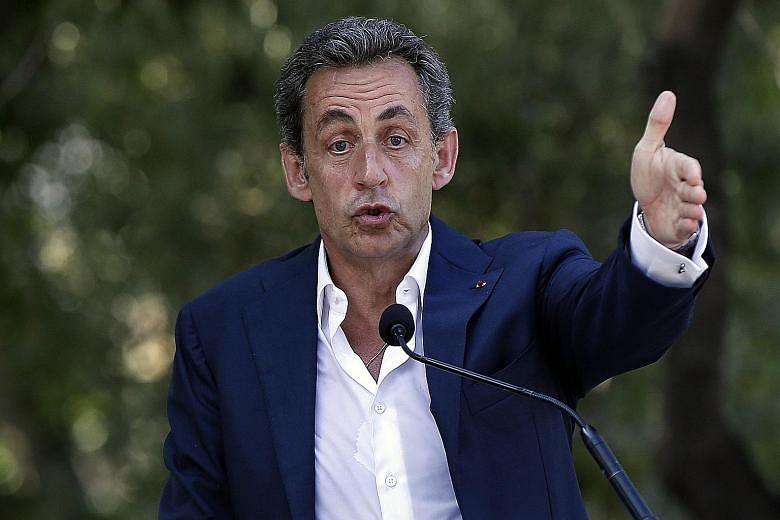Hair blowing in the wind, chest sporting a gold medallion and his attractive wife, model Carla Bruni, dressed in the skimpiest of bikinis closely by his side, former French president Nicolas Sarkozy is making sure that even during August, a month when most of his country's politicians traditionally take their summer break, his holiday pictures adorn the front pages of France's newspapers.
And for good reason, since Mr Sarkozy, who ruled France from 2007 to 2012, is determined to reclaim the presidency.
The road ahead is long and arduous: Mr Sarkozy first has to secure in October next year the nomination of his right-wing party, and then has to defeat incumbent President Francois Hollande at the general election scheduled for May 2017. Anything can happen between now and then - if a week is a long time in politics, two years are an eternity.
Still, few people have more drive and ambition.
As one of the former president's aides told the French media, Mr Sarkozy is obsessed with winning every fight and avenging any failure. "That's his psychology and temperament. For him, politics is a physical combat," the aide said.
"Sarko", as he is popularly known, is doing everything in his power to dispel the criticism that used to be hurled at him.
Gone are the expensive, ostentatious watches and platinum bracelets, fripperies which won Mr Sarkozy the nickname "Mr Bling". Apart from the chest medallion, which stays put as proof of his enduring virility, most other sparkling accessories have disappeared.
In a country that likes its presidents to be intellectuals, Mr Sarkozy also posted on Twitter a picture of himself reading a book, ignoring jibes that he was never photographed with a book before.
And in every public statement he now makes, he goes out of his way to deny that he is just hungry for office, claiming instead that he is simply fulfilling a patriotic mission.
"The first presidential campaign is about envy and desire for power," he told a local journalist. "For the second campaign, the real engine which drives you is duty."
But the Sarkozy comeback campaign is more than just about media packaging, for it is underpinned by a shrewd political strategy.
His first move was to engineer the merger of a number of centre- right political parties, with the aim of providing a single opposition platform against the ruling Socialist Party of Mr Hollande.
The new movement, which bears the name of the Republicans, has already scored a major triumph: In local elections earlier this year, the Republicans gained control over 67 of the country's 100 regional departments.
This victory not only boosts the Republicans' hopes of ousting the Socialists, but is also a major personal achievement for Mr Sarkozy: He has confounded critics who doubted his electoral appeal.
This does not mean that Mr Sarkozy has his party's presidential nomination sewn up. His biggest challenge comes from former prime minister Alain Juppe, who, according to current opinion polls, is more popular. But the popularity gap between the two men is not more than a few percentage points.
Furthermore, all opinion polls indicate that either of them should be able to go on and defeat Mr Hollande in 2017. This means that the former president has everything to fight for.
And Mr Sarkozy's biggest asset may well be his ability to attract votes from the anti-immigrant, far-right National Front. The Front is now run by Ms Marine Le Pen, who succeeded in rebranding a fringe movement known for its racist views into a mainstream party which regularly gets the support of about 15 per cent of French voters.
Only Mr Sarkozy has the ability to attract these "errant voters", as he recently called them, away from the Front. And that is crucial in France's two-round presidential election, in which all but the top two presidential candidates are eliminated in the first round of ballots, and the ultimate winner in the second round is the candidate who can reach outside his traditional constituency by attracting voters from other parties.
Mr Sarkozy is carefully positioning himself to be that providential candidate.
Still, he has got to be careful, for some of his clever publicity gimmicks can backfire. That was the case with his recent claim that he frequently devotes time to cycling up mountains and that his bodyguards have difficulty keeping up with him - all intended to prove that the 60-year-old is full of life.
A photograph showing Mr Sarkozy cycling alone on a mountain slope was duly released. But it soon emerged that the picture was doctored and that a security officer who evidently had no problem keeping up with the former president was simply airbrushed out of the photo frame.
A small detail for some, but a reminder of what Mr Sarkozy is about for other French voters.

